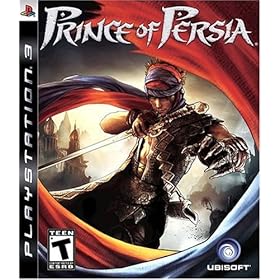
Prince of Persia isn't as good as the better parts of the trilogy from the previous generation, but it's a solid beginning to another chapter in the franchise's history. The only thing I can really say it does definitively better is the visuals, and the game really does look amazing. It's not just the technical proficiency of the same engine that did Assassin's Creed, with a consistent frame rate despite massive draw distances. The art style, which the developers call "illustrative", is just gorgeous to look at. Just looking at the environment, especially once it's been healed and returned to its former glory, is always fun. It helps slightly obscure the fact that the gameplay is a bit more limited than I usually like. It might be a mental thing, but the acrobatic platforming seems more forced than it did before. In earlier games, you had to run along walls, swing on polls, climb up columns, and so on to find your way around the world, but you still felt like you were in a place that existed, whether it was a collapsing castle or a city overrun with monsters. Prince of Persia mostly feels like a video game environment with a pretty coat of paint. The platforming is more directly laid out, with specific paths to the next area obviously laid out, just waiting for you to press the right sequence of buttons. The fun of figuring out how you actually get somewhere before you do it is gone, and while running, jumping and grabbing is still enjoyable, and even more out there with new things like clambering across the ceiling, it's only a part of the puzzle.
I also feel like the combat is a big step backwards. People complained about the fighting in the earlier games, and for good reason. Battles went on for too long, and adding a complicated combo system didn't help much. The new game's combat seemed like a good approach at first, with an intuitive attack system and some interesting bosses, but it just got worse as it went on. Enemies start to change into forms that only allow for a specific sort of attack, limiting the freedom that made it interesting, and begin to use way too many scripted moves that require you to hit or mash a button to avoid it, turning it into a tiring affair. Fighting the same boss six times before it was finally finished didn't help keep things interesting, either.
In the same spirit as Farah, sort of, the game introduces Elika, your companion throughout the game. She ends up being important to the gameplay as well as the story, and luckily she's pretty likable. Instead of the ability to rewind time when you screw up and fall to your death, Elika uses her powers to save you and return you to the last place you were safe. While platforming, this means the last normal spot you could stand on, and in combat, it gives the enemy a chance to recover health. Some people think this makes the game too easy, but really it's just different. In some situations, it's actually less forgiving than rewinding time. If you were prone to running out of the sands in earlier games, then dying would send you back to the last checkpoint, and in that way, Elika was helpful. But generally, being returned to where a platforming segment began is harsher than just rewinding a bit to undo a tiny mistake partway through, and her magic actually promotes an awkward tactic in combat. Each subsequent time she saves you, the enemy recovers a smaller portion of their health, so if you have a tendency to screw up while fighting, it makes sense to fail on purpose in the beginning, so doing so later in the fight is less of a setback. Not that it's usually a problem, because it's not Elika that makes the game really easy so much as the overall design of the game, which tends to lead you by the nose to the next plot point.
Although thankfully the plot is decent enough. I'm not a huge fan of the voice actors, who work fine as normal people, but sound out of place in the game's outlandish fantasy setting. You can stop and talk to Elika throughout the game, and too often early on they just try to be clever and it can often fall flat. But as time goes on, they get more serious about their quest and start to know more about each other as people. Even the incidental dialogue while you're running around evolves to show a growing connection between them. The personal relationship makes the otherwise somewhat uninspired plot a bit more engrossing. I wonder how dynamic the story really is, considering the amount of choice you have with how you play through the game. I don't generally think that a world that can be seen in a variety of orders is necessarily more interesting than a carefully constructed single path, but it would be interesting if I ever played it again to see how it changes by going through it in a completely different way. Eventually you heal all the lands and defeat all the enemies and come to the final part of the game back where you started. The whole finale, with the unusual perspective while fighting the boss, and the interactive ending that forces you to do something you might not want to, is pretty compelling, and shows how game designers are continuing to evolve how their products present story. And while the inevitable cliffhanger is a bit disappointing, the actual emotional weight of the decisions made is more than I really expected from the game. In general I find fault with many of the things Prince of Persia does, but I think it's worth experiencing.
AAAAAGGGHHHH
16 years ago


































No comments:
Post a Comment